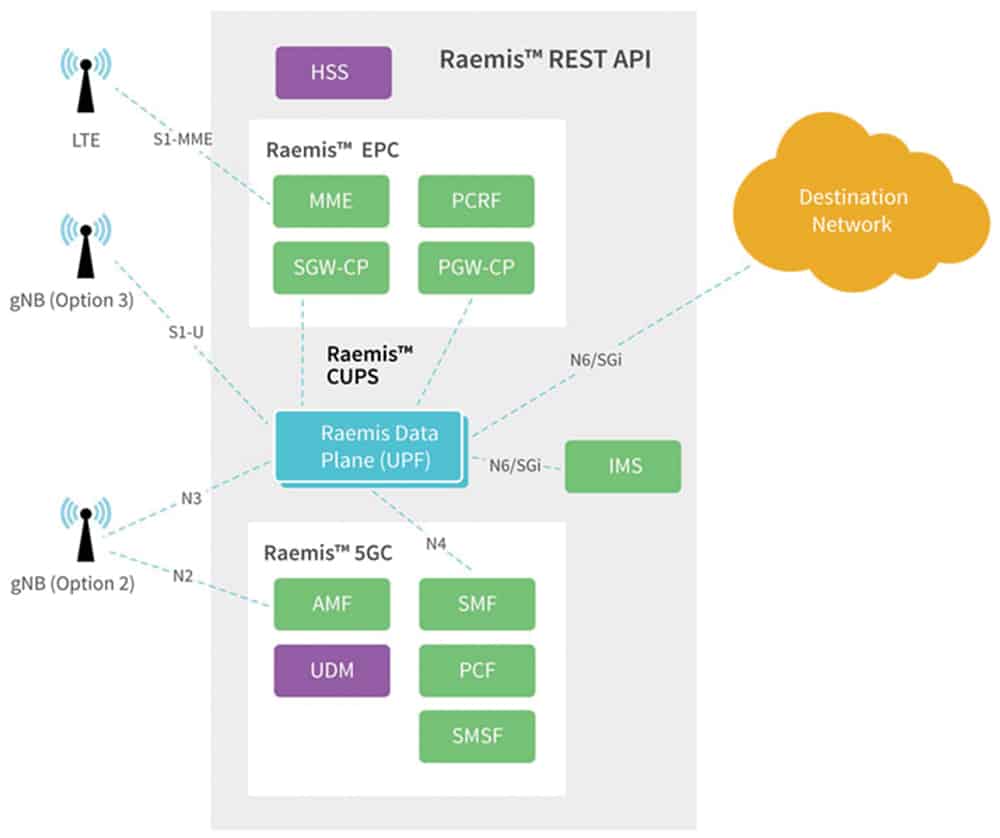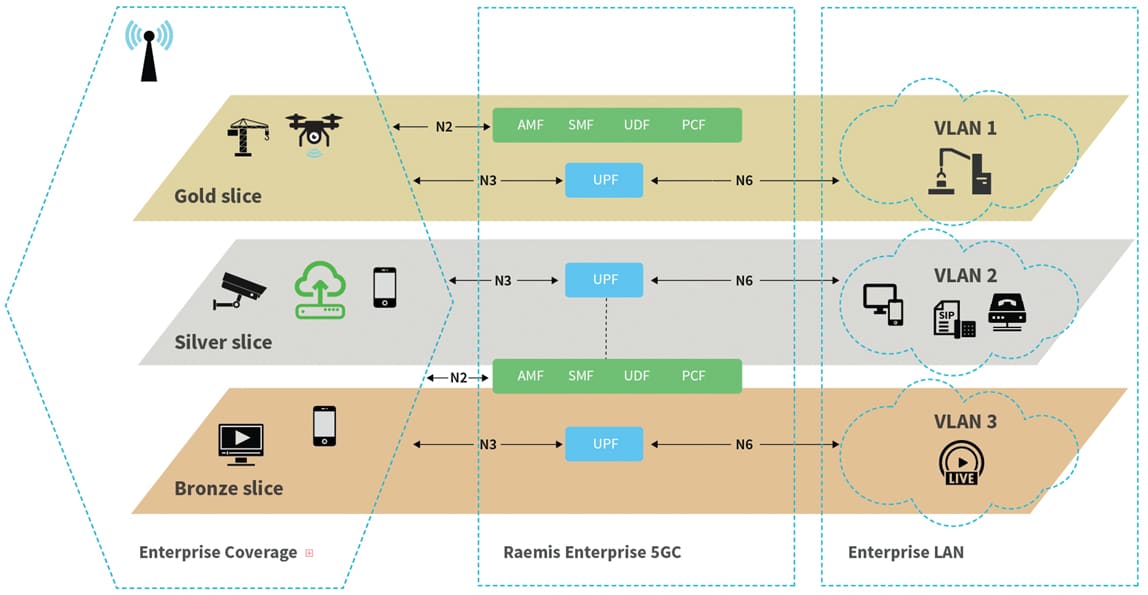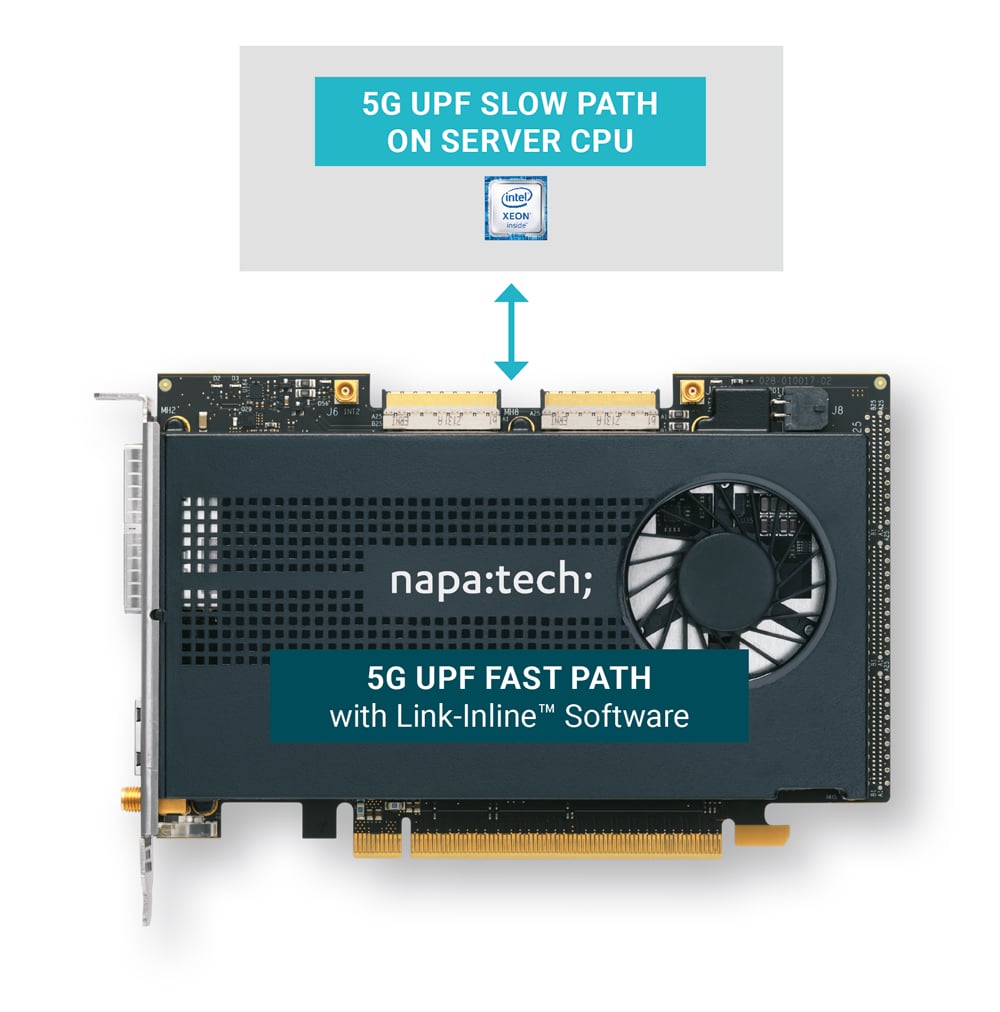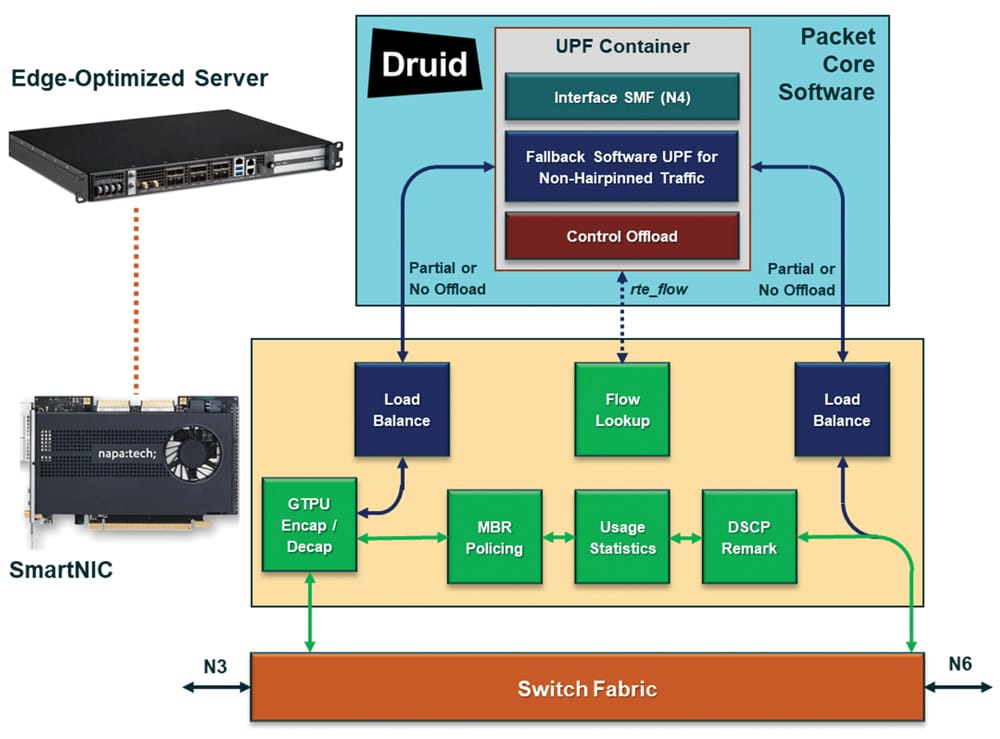

Druid Software maximizes the efficiency of private wireless networks via Kontron edge servers that leverage Napatech SmartNICs to offload compute-intensive workloads
Solution Brief
Watch video from MWC2023: Kontron servers for edge deployments, configured with Smart Network Interface cards from Napatech that offload and accelerate the compute-intensive User Plane Function (UPF), freeing up the server’s CPU for running applications and services. Presented by Napatech Senior Director Business Development Charlie Ashton and by Kontron Kevin Smith Field Sales Engineer. Video by Kontron.
Enterprises with a need for highly reliable, business-critical mobile communications are increasingly adopting private cellular networks in preference to public cellular or WiFi alternatives. In order for these networks to be cost-effective for markets like healthcare, government offices, utilities, universities and airports, it’s important for them to maximize the number of client devices that can be supported in a small-footprint server.
Druid Software, a provider of private cellular network software, has optimized the cost-performance of their infrastructure by deploying their software on servers from Kontron that are designed for edge deployments, configured with Smart Network Interface cards from Napatech that offload and accelerate the compute-intensive User Plane Function (UPF), freeing up the server’s CPU for running applications and services.
This solution brief summarizes the details of this solution for private network infrastructure.
Delivering private cellular networks for business-critical applications
Druid’s cellular solutions for business are built on its Raemis™ technology platform. Raemis is a set of cellular software assets originally crafted by Druid’s engineers and optimized for business use cases. The Raemis platform harnesses 5G, 4G, 3G, 2G and WiFi radios from any vendor to implement standalone cellular core network solutions. It also integrates with mobile network operators using standard interfaces giving access to all of the radio resources of these operators.
Some of the key features of Druid’s platform are:
- Built-in REST API: components are engineered from the ground up with a built-in API. The Raemis platform facilitates exposing the internal state of the platform easily using a HTTP API based on REST principles. This makes Druid solutions very friendly to integration with external enterprise applications and enables a dynamic best-in-class user interface to Druid’s solutions.
- Virtualized Solution: The Raemis platform builds in virtualization support for all Druid’s solutions. Solutions can be delivered as virtual machines or even as containers with the Raemis built-in orchestration capabilities making it easy to deploy scalable and resilient virtualized solutions for business.
- Customizable Technology: Since Druid has implemented the Raemis platform from scratch, it is in full possession of all the IPR and know how in the platform. This makes it easy for Druid to customize the platform for particular business use cases.
- 5G Migration path: Raemis provides an easy migration path from LTE to 5G NSA and onwards from 5G NSA to 5G SA. The same Raemis platform can be used for all these technologies, even at the same time, with a common integration of the private cellular network to the enterprise network.
- 4G/5G Network Slicing: Raemis Network Administrators will not notice much difference in adding 5G radio coverage to their private LTE networks. The Raemis private LTE core network has already sliced 4G into individual dedicated networks enabling separated QoS and security for specific groups of users. The 5G RAN only enhances this capability, offering additional levels of separation for QoS and security. It also offers enhanced throughput and lower latency, all with the same easy-to-use interface and a direct upgrade path from the 4G deployments to support 5G.
On-premise network infrastructure faces different challenges to cloud data centers. To ensure that their on-premise deployments are as cost-effective as possible, Druid runs their software on servers that are optimized for edge use cases. Kontron edge servers meet these requirements.
Kontron edge servers address the needs of private networks
The Kontron high-performance ME1310 multi-access edge server is a rugged, long-life, power-efficient, and multi-purpose system designed to decrease network congestion and improve the performance of applications by getting task processing closer to the user. Powered by Intel Xeon D-2700 family processors, the ME1310 enables applications such as virtual RAN (v-RAN), Artificial Intelligence (AI), data caching, and other ultra-low latency and high-bandwidth edge applications.
With support for wide temperature range (-40°C to +65°C), the ME1310 solves restricted space and power challenges by condensing multiple functions and devices into one rack unit (RU), saving space, cabling, and costs. The ME1310 is also available in a hardened passively cooled, IP-65 sealed enclosure (named RS1310) to support deployments directly into an outdoor setting (including pole mount).
The Kontron ME1310 has a built in 12-port, 200 Gbps switch for fiber optic front haul connections. The switch features four SFP28 and eight SFP+ ports to support fiber-optic connections at 25 GbE or 10 GbE.
The ME1310 server supports up to 512GB of DDR4 memory at 3200MHz. For storage, the server supports four M.2 low profile memory banks supporting up to 2TB of RAID storage. Kontron has built independent management into the server that includes support for the Redfish application programming interface (API) and Intelligent Platform Management Interface (IPMI) v2.0 Secure Remote Management Capabilities (encrypted firmware, boot, storage, secure boot and failsafe boot).
Implementing Kontron’s common design in both fan-cooled / rack mount and IP65 / passively cooled enclosures enables a single software image and development effort to be applied to different operating environments.
In order to maximize the performance of the User Plane Function (UPF) subsystem within their private network packet core, Druid leverages the UPF offload solution from Napatech that comprises a high-performance SmartNIC together with an optimized software stack.
Napatech’s SmartNIC solution delivers industry-leading UPF performance in an industry-standard environment
Napatech addresses the business imperative of minimizing the cost-per-device or cost-per-user for 5G packet core deployments by providing an integrated hardware/software solution that delivers industry-leading UPF performance. This solution comprises a fully-offloaded UPF fast path implemented within the Link-Inline™ software stack, running on the NT200 and NT400 PCI-Express (PCIe) SmartNICs.
Napatech’s UPF offload solution enables Druid to support significantly more users or devices per server than with either a pure software solution or competing offload solutions, while at the same minimizing the overall cost per user and improving energy efficiency.
Using a single NT200 or NT400 SmartNIC to sustain 2x100G of full duplex traffic, the Napatech UPF Offload software processes up to 185 million concurrent flows, with a flow learning rate greater than 3 million flows per second, achieving a total throughput of up to 297 million packets per second (stateless operation) and ensuring full wire speed operation for typical packet sizes.
Napatech’s UPF offload solution is fully compatible with the industry-standard DPDK RTE_FLOWS API for flow configuration. This ensures that 5G packet core software vendors like Druid can readily leverage the performance benefits of the Napatech solution without having to rewrite their software to use a proprietary API. Kubernetes support enables the solution to be deployed within a cloud-native environment using a standard orchestration platform.
From a hardware perspective, the NT200 SmartNIC is a full-height, half-length PCIe Gen3 card with standard QSFP28 network ports, while the NT400 is a full-height, half-length PCIe Gen4 card with standard QSFP56 ports. These SmartNICs fit into industry-standard servers like the Kontron ME1210 as an alternative to standard or “foundational” NICs that provide no offload features.
End-to-end packet core solution maximizes system performance while minimizing server CPU utilization
The combined packet core solution from Druid Software, Kontron and Napatech implements the UPF data path as a port-to-port “hair-pinned” architecture, which ensures that following initial setup all flows are processed on the SmartNIC with no need for traffic to flow to and from the server CPU. This maximizes the overall performance of the system while minimizing the utilization of the server CPU, freeing up its resources for running control plane functions as well as edge applications and services.
Summary
Enterprises with a need for highly-reliable, business-critical mobile communications are increasingly adopting private cellular networks in preference to public cellular or WiFi alternatives. In order for these networks to be cost-effective, it’s important for them to maximize the number of client devices that can be supported in a small-footprint server.
By leveraging Napatech’s SmartNIC-based UPF offload solution running on an edge server from Kontron, Druid Software has optimized the cost-performance of their private cellular network infrastructure for markets like healthcare, government offices, utilities, universities and airports.

Druid Software is a core cellular network software company based in Ireland. Established in 2000 Druid Software has evolved into one of the world’s leaders in Private 5G & 4G Cellular technology over the last 23 years. Druid Software’s RAEMIS™ platform is a mature 3GPP compliant 4G/5G core network, with unique features designed specifically for business and mission critical use. Druid Software technology enables solutions in different areas including enterprise communications, IoT, mobile edge computing, Neutral Host and public safety.
For more information, visit
www.druidsoftware.com
Druid Software Ltd
Bray, Republic of Ireland
+353 (0) 1 201 4752

Kontron is a global leader in IoT/Embedded Computing Technology (ECT) and offers individual solutions in the areas of Internet of Things (IoT) and Industry 4.0 through a combined portfolio of hardware, software and services. With its standard and customized products based on highly reliable state-of-the-art technologies, Kontron provides secure and innovative applications for a wide variety of industries. As a result, customers benefit from accelerated time-to-market, lower total cost of ownership, extended product lifecycles and the best fully integrated applications.
For more information, visit
www.kontron.com
Kontron Inc
Montreal, Canada
+1 (450) 437-5682
Napatech is the leading supplier of programmable SmartNIC solutions used in telecom, cloud, enterprise, cybersecurity and financial applications worldwide. Through commercial-grade software suites integrated with robust, high-performance hardware, Napatech accelerates telecom, networking and security workloads to deliver best-in-class system-level performance while maximizing the availability of server compute resources for running applications and services.
For more information, visit
www.napatech.com
Napatech A/S
Copenhagen, Denmark
+45 (0) 4596 1500




